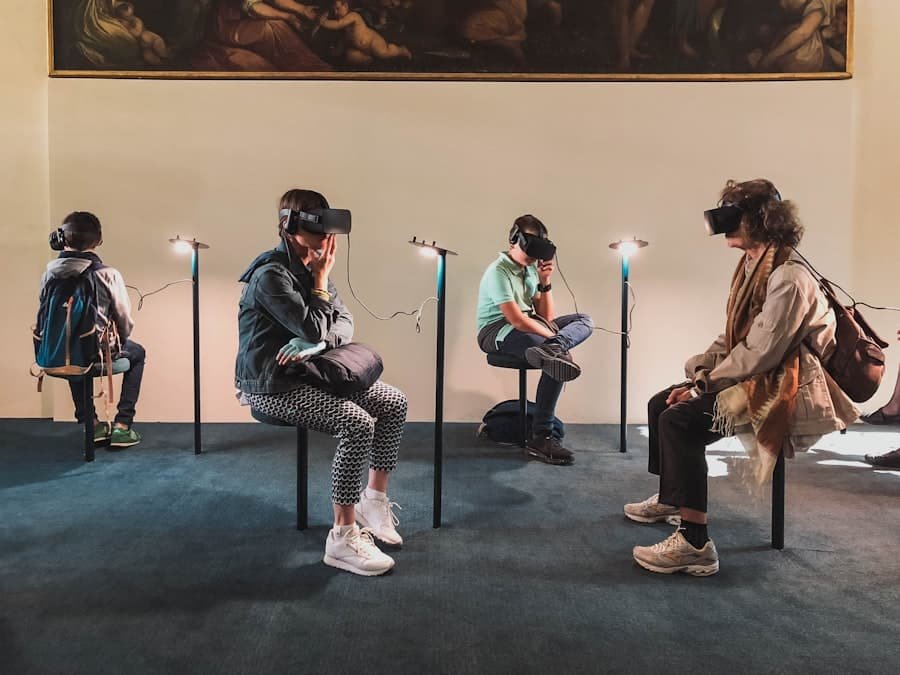The integration of artificial intelligence (AI) into the gaming industry has transformed the landscape of interactive entertainment, marking a significant evolution in how games are designed, developed, and experienced. Historically, AI in gaming was primarily limited to simple algorithms that dictated non-player character (NPC) behaviour, often resulting in predictable and repetitive interactions. However, as technology has advanced, so too has the sophistication of AI systems.
The rise of machine learning and neural networks has enabled developers to create more complex and responsive AI that can adapt to player actions in real-time, leading to a more dynamic gaming environment. The proliferation of AI technologies has coincided with the increasing demand for immersive and engaging gaming experiences. Players now expect not only visually stunning graphics but also intelligent systems that can enhance gameplay.
This shift has prompted game developers to invest heavily in AI research and development, resulting in innovative gameplay mechanics and storytelling techniques. From procedural content generation to advanced NPC behaviours, AI is now at the forefront of game design, allowing for richer narratives and more engaging worlds that respond to player choices in unprecedented ways.
Summary
- AI in gaming has seen a significant rise, revolutionizing the industry with its capabilities.
- AI-driven game design and development have led to more efficient and innovative game creation processes.
- AI-powered gameplay and immersion have enhanced the overall gaming experience for players.
- The impact of AI on player experience has been profound, shaping the way games are played and enjoyed.
- Ethical and social implications of AI in gaming are important considerations for the industry and its future development.
AI-Driven Game Design and Development
AI-driven game design has revolutionised the way developers approach the creation of video games. Traditional game development often involved a linear process where designers meticulously crafted every aspect of the game world. In contrast, AI allows for a more iterative and flexible approach.
For instance, procedural generation techniques powered by AI can create vast, intricate landscapes and levels that would be impractical to design manually. Games like “No Man’s Sky” exemplify this approach, where entire planets are generated algorithmically, offering players a virtually limitless universe to explore. Moreover, AI can assist in playtesting and balancing games during development.
By simulating thousands of playthroughs, AI can identify potential issues such as difficulty spikes or unbalanced mechanics that might not be apparent through traditional testing methods. This data-driven approach enables developers to refine their games more effectively, ensuring a smoother experience for players upon release. Additionally, AI can analyse player behaviour and preferences, providing insights that inform design decisions and help tailor the game to meet the expectations of its audience.
AI-Powered Gameplay and Immersion

The incorporation of AI into gameplay mechanics has significantly enhanced player immersion and engagement. Advanced AI systems can create NPCs that exhibit realistic behaviours and emotions, making interactions feel more genuine. For example, in games like “The Last of Us Part II,” NPCs are designed with sophisticated AI that allows them to react dynamically to player actions, creating a sense of unpredictability and realism that draws players deeper into the narrative.
These characters can express fear, aggression, or even empathy based on the player’s choices, enriching the overall storytelling experience. Furthermore, AI can facilitate adaptive difficulty levels that respond to a player’s skill and playstyle. This ensures that players remain challenged without becoming frustrated, as the game adjusts its parameters in real-time based on performance metrics.
Titles such as “Dark Souls” have employed similar concepts, where enemy behaviour adapts to player strategies, creating a unique challenge for each individual. This level of responsiveness not only enhances gameplay but also fosters a deeper emotional connection between players and the game world.
The Impact of AI on Player Experience
The impact of AI on player experience is profound and multifaceted. One of the most significant benefits is the ability to create personalised gaming experiences tailored to individual preferences. By analysing player data, AI can recommend content or adjust gameplay elements to suit a player’s style.
For instance, in role-playing games (RPGs), AI can track choices made by players and alter storylines or character interactions accordingly, leading to unique narratives for each player. This level of personalisation fosters a sense of ownership over the gaming experience, encouraging players to invest more time and emotion into their journeys. Moreover, AI enhances social interactions within gaming communities.
Multiplayer games increasingly utilise AI to facilitate matchmaking processes that pair players with similar skill levels or playstyles, ensuring a more balanced and enjoyable experience. Additionally, AI-driven chatbots and virtual assistants can enhance communication among players by providing real-time information or support during gameplay. This not only improves the overall experience but also fosters a sense of community among players who share similar interests and challenges.
Ethical and Social Implications of AI in Gaming
As with any technological advancement, the rise of AI in gaming raises important ethical and social considerations. One major concern is the potential for AI to perpetuate biases present in training data. If developers are not vigilant about the data used to train AI systems, there is a risk that NPC behaviours or storylines may inadvertently reflect harmful stereotypes or reinforce negative societal norms.
This issue highlights the need for diverse teams in game development and rigorous testing to ensure that AI systems promote inclusivity rather than exclusion. Another ethical consideration revolves around data privacy. Many games collect extensive data on player behaviour to inform AI systems and enhance personalisation.
While this can lead to improved experiences, it also raises questions about how this data is stored, used, and shared. Players may be unaware of the extent to which their information is being collected or how it might be used beyond enhancing gameplay. Developers must navigate these concerns carefully, ensuring transparency and giving players control over their data while still leveraging AI’s capabilities.
The Future of AI and Virtual Reality in Gaming

The future of gaming is poised for an exciting intersection between AI and virtual reality (VR). As VR technology continues to advance, the integration of sophisticated AI systems will enable even more immersive experiences. Imagine stepping into a virtual world where NPCs not only react intelligently but also engage with players in meaningful ways that mimic real-life interactions.
This could lead to entirely new genres of games focused on social interaction or emotional storytelling within virtual environments. Moreover, as hardware capabilities improve, we can expect AI-driven procedural generation techniques to create expansive VR worlds that feel alive and responsive. Players could explore vast landscapes filled with dynamic ecosystems where flora and fauna behave according to realistic patterns driven by AI algorithms.
This level of detail would not only enhance immersion but also encourage exploration and discovery in ways previously unimaginable.
AI and Personalized Gaming Experiences
Personalisation in gaming has reached new heights with the advent of AI technologies. By leveraging machine learning algorithms, developers can create experiences that adapt to individual player preferences on multiple levels. For instance, an RPG might analyse a player’s choices regarding character development or quest completion and subsequently tailor future missions or character interactions based on those decisions.
This creates a unique narrative journey for each player, fostering deeper engagement with the game’s world. Additionally, personalised gaming experiences extend beyond narrative choices; they encompass gameplay mechanics as well. AI can adjust difficulty levels dynamically based on a player’s performance history or even suggest specific strategies tailored to their strengths and weaknesses.
This ensures that players remain challenged yet not overwhelmed, enhancing satisfaction and prolonging engagement with the game.
The Evolution of AI in Competitive Gaming
In competitive gaming, often referred to as esports, the evolution of AI has introduced new dimensions to both gameplay and training methodologies. Advanced algorithms are now being employed to analyse player performance at an unprecedented level of detail. Coaches and players utilise these insights to refine strategies, improve teamwork dynamics, and identify areas for individual improvement.
For example, tools like OpenAI’s Five have demonstrated how AI can compete at high levels in games like Dota 2, providing valuable lessons on strategy optimisation. Furthermore, AI’s role in competitive gaming extends beyond analysis; it also influences matchmaking systems that ensure fair competition among players of varying skill levels. By employing sophisticated algorithms that consider numerous factors—such as win rates, play styles, and even psychological profiles—developers can create balanced matches that enhance the overall competitive experience.
As esports continue to grow in popularity, the integration of AI will likely play a pivotal role in shaping its future landscape, driving innovation both on and off the virtual battlefield. The rise of artificial intelligence in gaming represents a paradigm shift that is reshaping how games are created and experienced. From enhancing game design processes to personalising player experiences and addressing ethical concerns, the implications are vast and complex.
As technology continues to evolve, so too will the role of AI in gaming—promising an exciting future filled with possibilities for both developers and players alike.
AI and Gaming: The Future of Interactive Entertainment is a fascinating topic that explores the impact of artificial intelligence on the gaming industry. For further insights into the world of technology and business, you may be interested in reading this article on why mobile apps are important for your business. It delves into the benefits of mobile applications in enhancing customer engagement and driving business growth.
FAQs
What is AI in gaming?
AI in gaming refers to the use of artificial intelligence technology to create more realistic and immersive gaming experiences. This can include AI-controlled characters, dynamic game environments, and adaptive gameplay.
How is AI used in gaming?
AI is used in gaming to create non-player characters (NPCs) that behave more realistically, to generate dynamic and responsive game environments, and to adapt gameplay based on the player’s actions and decisions.
What are the benefits of AI in gaming?
The benefits of AI in gaming include more realistic and challenging gameplay, dynamic and adaptive game environments, and the ability to create more immersive and engaging gaming experiences for players.
What is the future of AI in gaming?
The future of AI in gaming is likely to involve even more advanced and realistic AI-controlled characters, more dynamic and responsive game environments, and the use of AI to create personalized and adaptive gameplay experiences for individual players.
